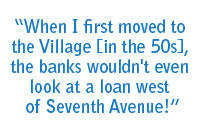 Arnold S. Warwick—born in Crown Heights, Brooklyn in 1931—founded an eponymous real estate management and brokerage company in Greenwich Village in 1963, and is still its chief executive. A longtime resident of Commerce Street, he and his wife Jane raised three children there. Warwick is also president of the Board of Directors of Westbeth, which he says, “Makes my retirement years interesting.”
Arnold S. Warwick—born in Crown Heights, Brooklyn in 1931—founded an eponymous real estate management and brokerage company in Greenwich Village in 1963, and is still its chief executive. A longtime resident of Commerce Street, he and his wife Jane raised three children there. Warwick is also president of the Board of Directors of Westbeth, which he says, “Makes my retirement years interesting.”
When Arnold S. Warwick moved to Greenwich Village in the mid-1950s, rents were modest—to say the least—by today’s standards. “We were on Carmine Street and the rent was $11 a month,” he recollects. “After that, we moved to a posh place on Jones Street that actually had a toilet in the apartment. That one rented for $17 a month.” Then he laughs. “These aren’t the prices of sandwiches, mind you. These are the actual rents we paid back then!”
Warwick’s subsequent move from renter to building manager wasn’t by way of his obstetrician father or schoolteacher mother, but rather through long-time Village resident and real estate agent Charles Keith. “Charlie was an interesting man,” Warwick recalls. “He was wounded three times in Spain between 1937 and 1939. He also spent thirteen months in a Fascist prison there. Then he came to the Village, became a house painter, opened a real estate office, and rented me an apartment. At that point I was selling tickets at the Cherry Lane Theatre and he asked me if I wanted to work in his office part time. So I worked there from noon to four or five and then went to the theatre to sell tickets.” Keith’s business was called Apartment Rentals Service, on West 8th Street. It was right next to the old Marlton Hotel. “We would hang out the window and watch all the people going into the hotel for afternoon assignations,” Warwick admits.
Eventually Warwick had to go elsewhere because Keith’s partner came back from Europe and “She couldn’t stand anyone else in the office,” he says. “So Charlie got me a job at Hanfield & Bell, also on 8th Street. They subsequently merged with another firm, at which point I was let go and opened my own management office. That was 1963 and I’ve been on my own ever since.”
Among several anecdotes as a building manager, Warwick recounts the time he was hired to move John Cage and Merce Cunningham, who lived together at 107 Bank Street. “The building they lived in was owned by a woman named Rose Slivka,” he says. “She was very involved in the Craft movement. She hired me to get them to move because she wanted to do something with the building. It wasn’t difficult or nasty or one of those landlord/tenant things. In fact, the two men were delighted to move and bought a space in a loft building over on Sixth Avenue. After I got them to leave, Rose promptly fired me.”
 When asked what some of the biggest changes he’s witnessed over the years in the West Village are, Warwick replies, “The new construction and the renovations of older buildings. And it’s really hard to weigh things like that. In some instances it’s good, and some bad. When they took dreadful slum-like buildings down, that was advantageous. When they took perfectly good buildings down because they wanted the land, then no. So it varies from spot to spot.” While there hasn’t been a huge amount of new construction in the West Village, he says there have been lots of conversions and renovations of older buildings. “When I first moved to the Village, the banks wouldn’t even look at a loan west of Seventh Avenue! However, as the loft movement began to blossom, developers started buying warehouses in the West Village and converting them. That development west of Seventh Avenue was amazing and it threw a lot of people into the area that might not have been able to fit in it otherwise.”
When asked what some of the biggest changes he’s witnessed over the years in the West Village are, Warwick replies, “The new construction and the renovations of older buildings. And it’s really hard to weigh things like that. In some instances it’s good, and some bad. When they took dreadful slum-like buildings down, that was advantageous. When they took perfectly good buildings down because they wanted the land, then no. So it varies from spot to spot.” While there hasn’t been a huge amount of new construction in the West Village, he says there have been lots of conversions and renovations of older buildings. “When I first moved to the Village, the banks wouldn’t even look at a loan west of Seventh Avenue! However, as the loft movement began to blossom, developers started buying warehouses in the West Village and converting them. That development west of Seventh Avenue was amazing and it threw a lot of people into the area that might not have been able to fit in it otherwise.”
After a half-century of residence, Warwick’s favorite aspects of living in the neighborhood are, “Walking to work. And all the restaurants that are available for lunch.” In addition, he claims that it was a terrific place to raise kids. Which brings him to what he thinks is one of the biggest challenges facing the West Village today. “It’s the necessity for people to find places for their children to go to school,” he says. “The shortage of schools in this neighborhood is definitely a problem. I certainly don’t think we have a shortage of dog walkers. Or, luckily, of very pretty women either.” He laughs. “All I’ve got left are my eyeballs!”
Photo: Arnold S. Warwick
